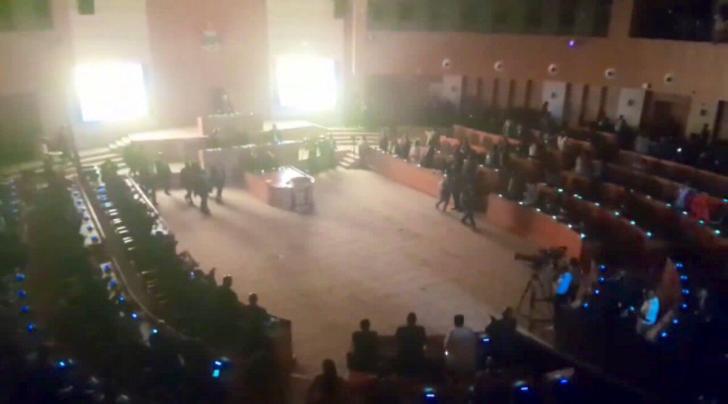News / National
Parliament apologises to Mnangagwa after budget speech power disruption
30 Nov 2024 at 13:08hrs |
1 Views

Zimbabwe's Parliament has issued an official apology to President Emmerson Mnangagwa and the nation after an embarrassing power outage occurred at the New Parliament Building during Finance Minister Mthuli Ncube's 2025 national budget presentation on Thursday.
The outage, which occurred during the closing remarks of Ncube's speech, saw President Mnangagwa escorted out of the facility in complete darkness, with parliament's backup generators taking several moments to come online. The incident raised questions about the reliability of the new building's infrastructure and the nation's ongoing power challenges.
ZESA spokesperson George Manyaya immediately addressed the situation, attributing the power failure to a fault caused by lightning. "It's an act of nature and definitely not load shedding, as is being suggested on social media," Manyaya stated, attempting to clarify the cause of the blackout.
However, Parliament's subsequent statement provided additional details, confirming that thunderstorms and high winds had affected overhead power lines, which resulted in a tripping of the 132kv feeder that supplies power to a substation feeding the Mt Hampden area, where the New Parliament Building is located. This fault also disrupted power in surrounding areas around 3:25 PM on Thursday.
Parliament explained that the building's standby generator was also affected by the power surge, which caused the generator to lose its memory settings, delaying its activation.
In the apology issued, Parliament expressed regret for the inconvenience caused, particularly during a time when both the nation and the international community were focused on Zimbabwe's economic outlook through the national budget. The incident underscored the country's ongoing struggle with electricity shortages, which have plagued both businesses and households for years.
Power outages have become a frequent challenge in Zimbabwe, with recurrent shortages often linked to declining water levels at Lake Kariba, the country's primary power source. While the government has pointed to the depletion of water reserves as a major factor, the blackout during such a high-profile event highlighted the broader issue of the nation's inability to secure a sustainable and reliable energy supply.
The embarrassing power cut has reignited concerns about Zimbabwe's energy sector, further exposing the inadequacies in addressing the long-standing power crisis that continues to hinder economic growth and development.
The outage, which occurred during the closing remarks of Ncube's speech, saw President Mnangagwa escorted out of the facility in complete darkness, with parliament's backup generators taking several moments to come online. The incident raised questions about the reliability of the new building's infrastructure and the nation's ongoing power challenges.
ZESA spokesperson George Manyaya immediately addressed the situation, attributing the power failure to a fault caused by lightning. "It's an act of nature and definitely not load shedding, as is being suggested on social media," Manyaya stated, attempting to clarify the cause of the blackout.
However, Parliament's subsequent statement provided additional details, confirming that thunderstorms and high winds had affected overhead power lines, which resulted in a tripping of the 132kv feeder that supplies power to a substation feeding the Mt Hampden area, where the New Parliament Building is located. This fault also disrupted power in surrounding areas around 3:25 PM on Thursday.
Parliament explained that the building's standby generator was also affected by the power surge, which caused the generator to lose its memory settings, delaying its activation.
In the apology issued, Parliament expressed regret for the inconvenience caused, particularly during a time when both the nation and the international community were focused on Zimbabwe's economic outlook through the national budget. The incident underscored the country's ongoing struggle with electricity shortages, which have plagued both businesses and households for years.
Power outages have become a frequent challenge in Zimbabwe, with recurrent shortages often linked to declining water levels at Lake Kariba, the country's primary power source. While the government has pointed to the depletion of water reserves as a major factor, the blackout during such a high-profile event highlighted the broader issue of the nation's inability to secure a sustainable and reliable energy supply.
The embarrassing power cut has reignited concerns about Zimbabwe's energy sector, further exposing the inadequacies in addressing the long-standing power crisis that continues to hinder economic growth and development.
Source - zimlive
Join the discussion
Loading comments…






























